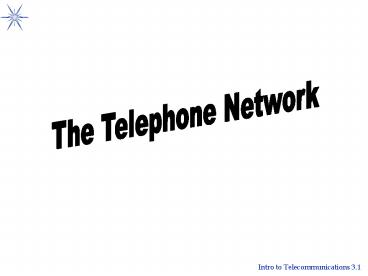The Telephone Network - PowerPoint PPT Presentation
1 / 18
Title:
The Telephone Network
Description:
Explain how the telephone network is laid out ... 66 block or RJ-21X. RJ-11C or RJ-12. RJ-45X. RJ-48X. RJ-68 (smart jack) USOC. Intro to Telecommunications 3.15 ... – PowerPoint PPT presentation
Number of Views:78
Avg rating:3.0/5.0
Title: The Telephone Network
1
The Telephone Network
2
The Telephone Network
The Telephone Network Objectives
- Chapter 3 Objectives
- Explain how the telephone network is laid out
- Discuss the differences between the various
office functions used in the hierarchy - Describe the different names applied to the
various carriers in the network - Describe the basis for the local loop
- Explain the pieces used to connect to the
customer location - Openly recognize the problems associated with the
local loop connections and the impairments that
can occur - Recognize the difference in the North American
Numbering Plan and discuss the problems being
poised now - Explain why we are running out of numbers today
3
The Telephone Network
The Telephone Network Terms
- Terms
- network
- demarc then and now
- who is the owner inside and outside?
- local loop
- Topology of connections
- Pairs of wires
- 2-4-8?voice, fax, data?
- xDSL
- Central office to the business/residence
- Star, ring configuration
- Wire center
- Frame, switch, routing decisions
- Links to other switches, interoffice trunks
4
The Telephone Network The Local Loop
- Local loop
- One pair of wires or equivalent
- Party line
- Outside plant
- Lateral distribution
- Station drop
- Aerial, underground feed, direct burial
5
The Telephone Network
The Telephone NetworkTypes of Communications
- The Local Loop
6
The Telephone Network Network Hierarchy
- Pre-1984
- ATT and BOCs most of the network
- Five-level architecture based on call completion
- Trunks between offices
- Wire, coax, radio, fiber optics
- Class 5 end office, closest to the customer
(19,000) - Class 4 toll center or tandem (940)
- Class 3 primary center (170)
- Class 2 sectional center (50)
- Class 1 regional center (10)
7
The Telephone Network
The Telephone NetworkTypes of Communications
- Network hierarchy pre- 1984
8
The Telephone Network Network Hierarchy
- Post-1984
- Separation of BOCs from ATT
- Call completions continued network intact
- Terms and connections
- LEC, ILEC, RBHC
- ICEC, IXC connections to BOC
- Equal access, digits, complexity
- Conforming, non-conforming offices
- POP
- Public-Switched Network
- PSTN
- Goal complete the call (shortest of quickest)
9
The Telephone Network
The Telephone NetworkTypes of Communications
- Tandem (Class 4) arrangement
10
The Telephone Network
The Telephone NetworkTypes of Communications
- Network after divestiture
11
The Telephone NetworkNorth American Numbering
Plan
- NANP 10 number-based
- Area code, N11
- 640 new codes, depleted 2005 to 2010
- Worldwide shortage
- Exchange code
- NNX, NXX
- Subscriber extension 2,3,4 more numbers?
- 10 or 11 numbers for local connection
- Private networks (owned equipment)
- Hybrid networks
- Local Access and Transport Areas (LATAs)
- Intrastate-Intra-LATA LEC
- Intrastate-Inter-LATA IEC
- Interstate-Inter-LATA IEC
- Interstate-Intra-LATA either/or
- Telecommunications Act of 1996
12
The Telephone Network
The Telephone NetworkTypes of Communications
- Private Network
13
The Telephone Network
The Telephone NetworkTypes of Communications
- Hybrid Network
14
The Telephone Network Wiring Connections
- Hooking things up
- Two, four wire
- 66 block or RJ-21X
- RJ-11C or RJ-12
- RJ-45X
- RJ-48X
- RJ-68 (smart jack)
- USOC
15
The Telephone Network
The Telephone NetworkTypes of Communications
- Basic forms of communications channels
- Simplex
- Half Duplex
- Full Duplex
16
The Telephone Network
The Telephone Network Equipment
- Connections and functions list (sample)
- Single line set
- Multiline set (key set)
- PBX (private branch exchange)
- Modem (data communications over analog network)
- Multiplexer (many users or conversations on
single line)
17
The Telephone Network
The Telephone NetworkTypes of Communications
- Connections and functions list (sample)
- ACD (automatic call distributor)
- VMS (voice mail system)
- Radio systems
- Cellular telephones
- Facsimile machines
- Centrex (central office exchange)
18
The Telephone Network
The Telephone NetworkTypes of Communications































